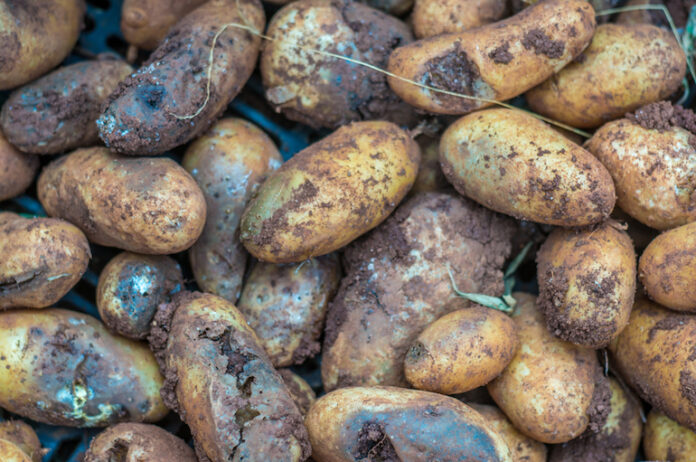Can you name the world’s primary food staple crops? Eleven come to mind including:
- bananas
- cassava
- corn (maize)
- plantains
- potatoes
- rice
- sorghum
- soybeans
- sweet potatoes
- wheat
- yams
For those of you who say wait a minute, aren’t sweet potatoes and yams the same? Surprisingly, no. They are two different plant species that through convergent evolution have produced a similar tuberous root crop.
But the subject of this posting is potatoes and the stresses that food staple crop is undergoing around the world. Potatoes are particularly susceptible to fungi. As a result, potato farmers use fungicides regularly to protect their plants and the spuds they harvest.
Whether it is early die diseases that cause the plants to wilt or fungal infections that blight the tuberous roots, potatoes are under siege. In temperate climates, the plants are attacked by Verticillum dahliae, a soilborne fungus that enters through the root systems. This fungus can devastate a potato farm cutting yields by as much as 50%.
Another caused by a soil-borne fungus, Synchytrium endobioticum, leads to a condition called potato wart or potato canker. The fungus lies dormant in soil for more than 40 years waiting for cool, wet spring weather and the presence of new potato plants. The end result is unmarketable produce. Canada’s Prince Edward Island, a potato-producing province, has seen the U.S. put an import ban on its harvests.
In wetter environments, Phytophthora infestans, another fungus, is responsible for a condition called late potato blight which can destroy up to 57% of the crop. P. infestans caused the Irish potato famine back in the mid-19th century. And today it is devastating potato crops in Bangladesh and Indonesia.
Fungicides have been the standard method of fighting the blight but often farmers miss the early signs and then fight the fungus through repeated applications throughout the growing season which in Indonesia lasts up to 160 days. Farmers can end up spraying their crops up to 30 times. Not only is this expensive, but the fungicides also damage the environment and human health.
For years, government regulators in many countries have banned genetically modified (GM) crops, including potatoes. But in the last few under a partnership involving the US Agency for International Development, Michigan State University (MSU), the Bangladesh Agricultural Research Institute (BARI) and the Indonesian Center for Agricultural Biotechnology Genetic Resources Research and Development, a GM potato that is resistant to late blight has been developed.
How was it done? The researchers identified wild potato species in South America, the birthplace of potatoes and using genetic modification transferred genes into Asian varieties. More than 30,000 varieties were screened until the ten best were selected for greenhouse and field trials. These late-blight-free potatoes have now been introduced in trials in both countries.
The GM potatoes have been designated LBR which stands for late blight resistant. Trials are expected to continue for at least two or three crop cycles before the LBR potatoes become available to farmers.
Biosafety regulations in both countries have lowered their resistance to adopting GM crops. Indonesia and Bangladesh are already growing GM cotton, and sugar cane and the latter country has approved a GM eggplant which has been very successful in improving harvests and income for local farmers.
LBR potatoes will reduce the application of fungicides by more than 90%. It will also mean increased yields and a healthier environment in both countries.
















